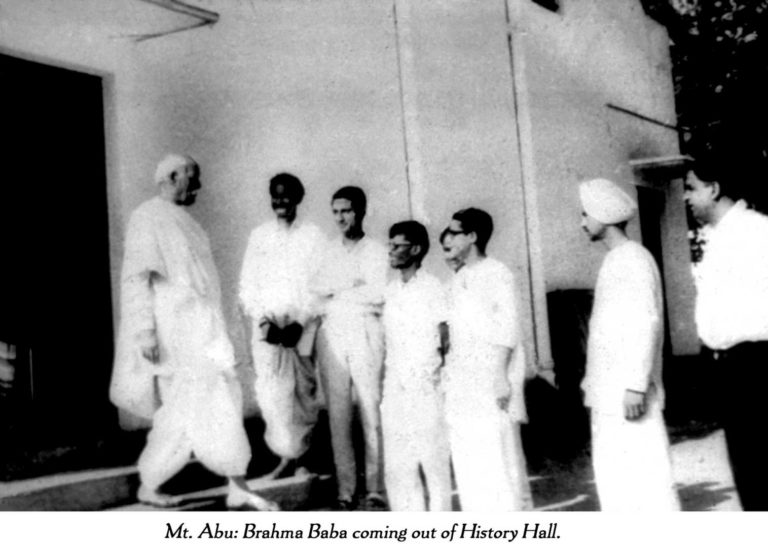Shivratri is celebrated in memory of the divine incarnation of the Incorporeal God Shiva. The word ‘Shivratri’ literally means the night of Shiva. Why is the advent of Shiva celebrated as the birthnight, and not as a birthday? The word “ratri” here does not connote the darkness that falls after sunset, but it signifies the darkness of extreme ignorance and unrighteousness in the world. Ratri or night is the period of darkness when sins and crimes of all kinds usually take place; when man gropes around for want of clear vision. Thus Shivratri indicates that God Shiva intervenes in the affairs of mankind when utter irreligiousness and unrighteousness prevails, shrouding the intellectual horizon of mankind.
The event of Shiva’s divine birth is celebrated on the 14th night of the dark phase of the moon, a night before Amavasya, the new moon night in the month of Phalgun, the last month of the Hindu Calender. The last month of the Calendar implies that God Shiva’s advent takes place at the end of the eternal cycle(Kalpa). The 14th darkest night of the dark phase of the moon implies that when God descends into this world, it is under the spell of extreme darkness of ignorance, unrighteousness, moral turpitude, spiritual lassitude, and religious decrepitude. This is described in scriptures as“Dharma Glani”. A night before the new moon-night implies that God Shiva’s incarnation takes place a few years before the end of the Iron Age.
The term “Shiva” literally means the benefactor of all. Hence, Shiva’s intervention in human affairs must have led to the establishment of heaven, the existence of which is mentioned in almost all the scriptures of the world. Such divine intervention has taken place at the darkest hour of human history when the human soul was groping in the darkness of ignorance about the self, the Creator, and the creation; when the souls were blinded by the vices of lust, arrogance, anger, greed, and attachment. Shivratri is being celebrated in memory of the benevolent act on the part of Shiva, the benefactor who repeats this act in every cycle of human history.
Shivratri is one of the most important festivals in India. This indicates that God Shiva, the Supreme Father of all human souls has incarnated in this land and exterminated the unrighteous of the Iron Age to usher in the righteous world of the Golden Age of Satyug. There are innumerable Shiva temples in India named after the divine attributes and acts performed by God Shiva; for example Amarnath(the lord of immortal deities), Somnath(the lord of the nectar of knowledge), and so on. There are even memorials of the worship of God Shiva by deities ShriRama (Rameswaram Temple in South India) and by Shri Krishna (Gopeshwar temple in North India). The incorporeal oval form of Shiva is symbolised in these temples with “Shivalinga”, on oval stone. The symbol of the incorporeal God Shiva the oval flame or images can be seen to be associated with God in all major religions of the world. For example, “Sang-E-Aswad ” in the holy Kaaba at Mecca, “Osiris” of Egypt, “Shium” of Babylon, and so on.
Incorporeal God Shiva, the sun of knowledge incarnates in a human medium to perform his role as the Purifier of all souls, the Destroyer of all vices, the Liberator from all bondages, Guide and Preceptor who shows us the way to a pure and viceless world of Golden Age. To bring about such a change, God Shiva gives bold, new concepts of Time and space, Man and Deities, Values and Morals, the Law of Action (Karma) and Reaction, and instilled into all sections of the society of the time the spirit of crusade so that they spread in all directions, this new knowledge using all means of mass communication.
God Shiva, the Supreme Father gives us Supreme Directions for self-transformation through which world transformation takes place. Such practices carried out during the transitional period called Confluence Age are symbolised in Bhakti (devotion) through different rituals. For example, the offering of the “Ak flower” to Shiva symbolises the act of eschewing wild negative traits like anger, lust, and greed. A yogi’s resolve to give up all impurities to become pure souls again is symbolised through fasting or abstinence from food on the day of Shivratri. For cleansing the soul, a Yogi takes daily both in the nectar of spiritual knowledge. This is emulated by devotees by taking both several times on the Shivratri to keep themselves clean. The Yogi surrenders himself to Shiva in thought, speech, and action, but devotees emulate this by offering leaves of the ‘Bel’ tree to Shivling. The Pouring of water and milk over the stone idol of Shiva drop by drop signifies the remembrance of Shiva in every thought. The Yogi keeps awake to the Supreme Directions of Shiva. The devotees emulate this by keeping awake throughout the night on Shivratri. During the Confluence Age, the Yogi stays in spiritual intoxication in the awareness of the deity sovereignty during the Golden Age; and this, the devotees emulate by offering intoxicants like Dhatura and Bhang to Shiva, and consuming the same themselves.
To celebrate Shivratri in the true sense, we have to realise the significance of the present auspicious time, the Confluence between the end of the Iron Age and the beginning of the Golden Age. Further, we have to realise that God Shiva has incarnated and is currently disseminating spiritual knowledge based on which self-transformation of souls and world transformation are taking place incognito. The Iron Age is going to end, and the Golden Age will emerge in its place ushering in a new world order.
May this Shivratri prompt all souls to transform themselves through spiritual knowledge and remembrance of God Shiva, thus ensuring their place in the Golden Aged World.





